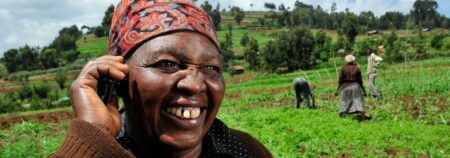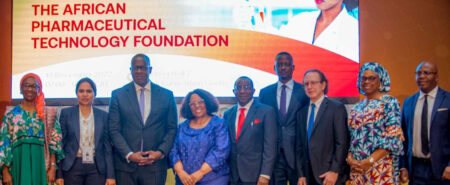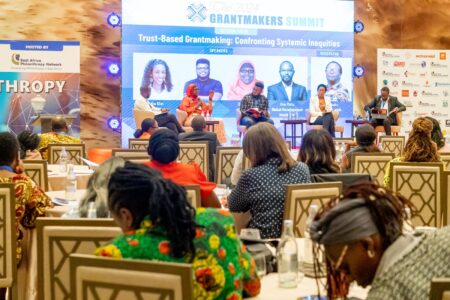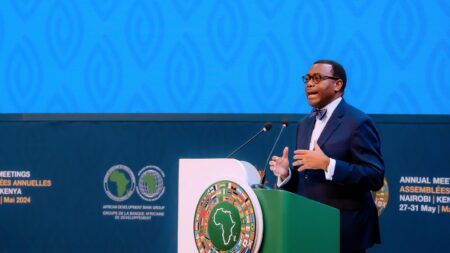NAIROBI, Kenya, Jun 17 – The African Development Bank has announced new rounds of funding for Zambia and Egypt.
In Zambia, AfDB has approved a $1.4 million grant from the Global Agriculture and Food Security Program to reduce malnutrition among the Southern African nation’s most vulnerable households.
The grant will be directed into the Mitigating Impacts of Covid-19 on Household Food Security Project and is expected to create about 150 permanent skilled or semi-skilled positions and 40 part-time unskilled jobs in crop, livestock, and fisheries value chains.
AfDB says the project will also supply inputs for crops, livestock, and aquaculture enterprises to promote good agricultural practices and increase food production, as well as a capacity-building component.
Commenting on the Zambian funding, AfDB’s Director of Agriculture and Agro-industry Martin Fregene said increased food supply resulting from additional grant funds will lead to more jobs, improved quality of life, and reduction of malnutrition in many impacted communities.
AfDB adds that the project provides supplementary funds to the ongoing Agriculture Productivity and Market Enhancement Project, a $32 million grant-funded initiative also from the Global Agriculture and Food Security Program, which has been managed by the Bank in the Sinazongwe, Gwembe, Chongwe, Rufunsa, Serenje and Chitambo districts of Zambia over the past five years.
Global Agriculture and Food Security Program administrators said the six districts were selected based on poverty levels, food insecurity and malnutrition prevalence. However, with this funding and program, these districts have the potential for economic growth, and to promote crop diversification. Some 5,000 people, including 3,750 women and 1,000 youth, will benefit. Some 5,000 people will also benefit indirectly along the commodity value chains.
Since the outbreak of Covid-19, Zambia has implemented bold measures to protect the health and economic well-being of its citizens. These steps included a nationwide program to scale up agricultural diversification. The Bank’s Covid-19 Response Facility launched in 2020 has been a lifeline to member governments by providing resources to tackle the pandemic.
“The facility will consolidate the Bank’s support for Zambia’s economic diversification and impact mitigation against Covid-19,” said Mary Monyau, the Bank’s Country Manager in Zambia.
The Zambian project is in line with the Bank’s High 5 strategic priorities, specifically, Feed Africa, Industrialize Africa, and Improve the quality of life for the people of Africa. Similar Bank projects have been successfully undertaken in Malawi, Niger, Liberia, Senegal, and the Gambia.
The Global Agriculture and Food Security Program was established as a response to the 2008/09 world food price crisis, following a commitment by the Group of 8 nations (G8) in September 2009 to mobilize up to $20 billion for agricultural development and food security.
The World Bank supervises about half of the project portfolio of the Global Agriculture and Food Security Program. The African Development Bank managed about a quarter in December 2019, and the International Fund for Agricultural Development, 11 percent.
Funding for Egypt
AfDB has at the same time approved an €83 million loan to finance the second phase of Egypt’s Electricity and Green Growth Support Program.
The funding is part of the Bank’s budget support to the Egyptian government to strengthen its electricity infrastructure, which is expected to bolster the private sector and accelerate recovery from the Covid-19 crisis.
According to the bank, the program seeks to enhance the power sector’s financial sustainability, governance and operations.
It will also advance the provision of clean, reliable energy to drive green growth.
Egypt’s successful reforms in the sector have led to greater private investment in utility-scale renewable energy projects.
“Egypt’s Vision 2030 instills the sustainability ethos across all sectors. Energy and electricity are amongst the top sectors in Egypt’s International Development Cooperation’s portfolio, pushing towards a green reform,” said Egypt’s Minister of International Cooperation, Rania Al Mashat.
“With 2021 being the year of private sector engagement, the Electricity and Green Growth Support Program will contribute towards sustainable growth and job creation and catalyze the development of Egyptian private entities,” she added.
Malinne Blomberg, the Bank’s Deputy Director-General for the North Africa Region, said the African Development Bank continues to actively engage with the Egyptian government and private sector companies to support the country’s medium-term development plan and economic reforms, with a particular focus on economic infrastructure such as energy, transport, water, and sanitation, as well as industrialization.
In addition to the African Development Bank, Agence Française de Développement and the Japan International Cooperation Agency have also provided financial support to Egypt’s Electricity and Green Growth Support Program.











